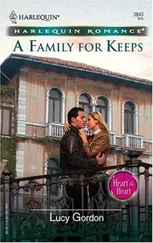Her response was just as breezy. “Very good. We watched TV and visited, and the time passed quickly.”
Andi felt a bit uncomfortable about having shared that with Gram, so she changed the subject. “Do you live in town?”
“Sure dodown the street a block.”
She didn’t think that she should ask about a family, but on this block the houses appeared to be too large and old for a single young man. She brought herself up short as she looked around the kitchen in this beautiful old home; some might think this too big for Gram, too, yet Andi couldn’t imagine her living in a two- or three-room apartment
“How are you coming with that staircase?” Gram asked.
“Slo-o-owly. Very slowly. But I am making progress, and that’s what’s important”
He’d been pouring orange juice as Gram turned the French toast in a heavy, cast-iron skillet. Instead of setting Andi’s glass on the table, he handed it to her. “What are you doing with your… staircase?” she asked.
“Long before I bought the house at auction two years ago, some idiot painted all the wood in the house white even the hand-turned spindles on the banisters, which are as elaborate as those in this house. I checked and found that everything’s made of chestnut, if you can believe that!”
She was evidently supposed to be impressed. “I’m sorry, but I don’t understand why that’s special.”
He carried maple syrup to the table, and sat down. “I don’t know about Illinois, but one of the major deciduous trees in Pennsylvania used to be a very large onethe chestnut. Many houses and barns around here were built of its lumber, as was much of the furniture. But then a blight came along and wiped out the American chestnut”
“All of them? Just like that?” She snapped her fingers.
“Just like that,” he replied. “All of them.”
Gram corrected him. “There are still a few, Keith.…”
“Not like they were, though. What have survived are runty little things, more like large bushes which live long enough to have a few crops of small nuts, then die.”
Gram placed the coffeepot on a trivet and joined them at the table. “Penn State’s forestry department, and other specialists, are working on resistant strains, but I don’t know how they’re making out. But it would be generations before we see chestnut lumber suitable for construction.”
“And so,” her grandson went on, taking Gram’s hand in his, “I want my chestnut exposed in all its glory.”
Andi hadn’t expected him to reach for her hand too, but willingly gave it, when he said, “Gram lets me offer the prayer when I come for breakfast”
That sounded fine until, looking deeply into her eyes, he suggested, “You may have that privilege if you’d like.”
“Oh, no!” Startled, she would have withdrawn her hand had he not been holding it firmly. “Thanks, any-way.”
This was the second time she’d been in this kitchen during prayers. Keith asked that those teaching and preaching would be blessed and that today’s services would go well and be meaningful for all who participated.
And then, quite conversationally, he prayed for Andithanking God that “Annie” had gotten here safely in spite of car trouble, and asking that her car could be fixed without too much difficulty.
She sneaked a look at him when he asked that her leg would soon get completely well. She’d said nothing to him about the accident nor her leg, and doubted that Gram had.
It was while eating her second piece of French toast covcred with syrup that Keith asked if she was joining them for churchand she realized she might like to. “Will your family be there?” That would be an additional incentive, she thought.
“Mom and Dad rarely miss. And my sister’s always there with her two kids.”
“How would I dress if I go with you?”
Gram’s open face showed pleasure. “You look fine as you are, Annie, with that lacy blouse, slacks and sandals.”
“Are pants okay?”
“Of coursethough you have time to change into a skirt if you’d feel more comfortable.”
She hadn’t meant to glance toward Keith, but saw his nod. “I’m with Gram. You do look good, just as you are.”
Heat crept up into her face, and totally unnecessary words spilled out. “I’ve been wearing pants most of the time since the accidentbecause of the scars.…”
His glance flicked downward, then back to meet hers. “Are they really that bad?” he questioned softly.
“To me, they are.”
His even, white teeth gnawed his lower lip. “Are you…a competent judge of that?”
That ankle and foot tucked behind the left one and were pulled as far back as they’d go under her chair. Her chin tilted upward. “I am the judge of that.”
His gaze held hers for an uncomfortable moment before he looked toward Gram and asked her to pass the syrup.
Now I’ve blown it! she chastised herself. I shouldn’t be so supersensitive. But they’d asked her to go with them, and she would.
It had been years since she’d been in church except for weddings and funerals. She used to go with Mother when they still lived in Claremont, back before Dad quit working for someone else so he could try developing his ideas and patents into practical inventions.
That was when Mother went back to teaching, so there’d be a steady income. Things were tough financially, and though she’d tried, Andi hardly remembered Dad from those days when he routinely spent twelve to eighteen hours a day at work.
But she’d never forget Motheralways cheerful and supportive, always there for Brownies, then Scouts, and for swimming and flute lessons. Never missing a band or choir concert. Taking her to the library and the museum.
By the time Dad had his twentieth patent; by the time the plant was built in Chicago and things were going really well there, Mother’s health had begun to fail.
In spite of the cancer, she’d been ableat what cost to herself?to furnish and decorate the new house and to serve as hostess for countless business dinners. When she went with Dad on trips to resort cities and other wonderful jaunts tied in with business, Andi was left at home. Mother would come back more exhausted than when she left, and gradually cut back on traveling. And on entertaining.
It had been fun having Mother around more, but Andi had not known the reason until six months before her death.
Why didn’t you tell me, Mother? Andi silently wondered. Why didn’t you let me know what you were going through? Oh, yes, I was busy with school and doing things with friends, but those weren’t important. I’d much rather have spent that time with you.…
They passed two churchesone stone, the other brickas they walked to the vinyl-sided church on Maple and Second streets. Smaller than the others, it resembled those on Christmas cards: white, with a corner bell tower, and large old pin oak and maple trees along the front and side.
They entered the sanctuary through the red front door, Keith carrying a tall pottery vase filled with Gram’s multicolored iris. Striding up the center aisle, between the rows of pews, he set the arrangement on a marble-topped table in front of the centrally placed pulpit.
He shook his head when Andi asked if the screening around the organ and choir, and the ornately carved pulpit and high-backed cushioned chairs on the platform, were made of chestnut. “I’m fairly sure they’re walnut.”
The sun shining through the stained-glass windows on her right gave an iridescent glow to everything, and she found herself whispering, “This is lovely.”
“We like it” The wrinkles radiating outward from the corners of Gram’s eyes deepened, and her voice showed pleasure. “Maybe partly because the Mc-Henrys and the Barkers my side of the familyhave come here for generations. It’s home.”
Читать дальше












